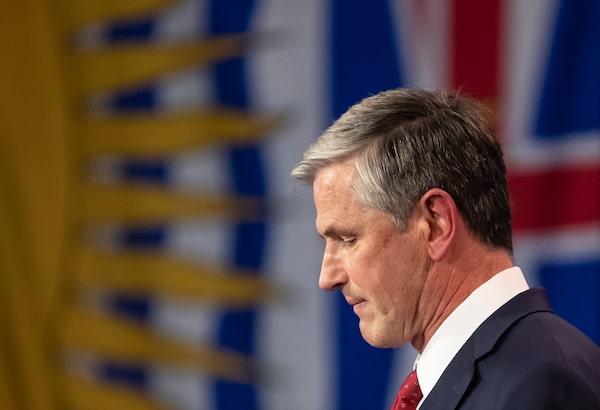
Then-BC Liberal Leader Andrew Wilkinson reads a statement in Vancouver on Oct. 24, 2020.DARRYL DYCK/The Canadian Press
Andrew Wilkinson’s Monday resignation as leader of the BC Liberals was the inevitable outcome of a thorough and humiliating defeat in the recent provincial election.
But anyone who thinks his decision eliminates the Liberals' biggest issue is kidding themselves.
It is not a stretch to suggest the party faces a crisis of almost existential dimensions. They are so lost right now they run the risk of never finding themselves again. The current state of play can be blamed on a number of factors, including blind arrogance, their failure to notice that changing demographics had shifted public opinion on a range of issues, and their decision to underestimate a political foe they foolishly preferred to mock rather than take seriously.
The names of several prominent Liberal politicians, past and present, have already surfaced as potential leadership contenders, but they should think hard about whether they really want the job. After all, Mr. Wilkinson wasn’t the problem. He was just a manifestation of it.
The Liberals find themselves in uncharted territory. In the 2017 election, the Liberals received 1,667 more votes than the NDP, but lost power when the NDP signed a confidence-and-supply agreement with the Greens to take control. This time around, the NDP garnered 116,194 more votes than the Liberals, a chasm that is likely to grow even more when mail-in and absentee ballots are counted, as historical trends suggest these votes favour the NDP.
There are other numbers equally as disturbing. The Liberals won only two of 11 seats in Vancouver, two out of nine in Surrey, zero of four in suburban Burnaby and one of four in Richmond. The news is equally grim in most other parts of Metro Vancouver; the most important battleground of the entire province – the Lower Mainland – has been taken over by the NDP. In the process, the Liberals have been pushed to the electoral fringes (the Interior and the north) and possibly to political extinction.
To those who think that’s going too far, allow me to direct you to the history of British Columbia’s Social Credit Party, which dominated the province for four decades starting in the 1950s and is now effectively defunct.
The seeds of the Liberal defeat were planted under the leadership of Christy Clark, who missed signals the electorate was sending that the NDP picked up on. For instance, the Liberals failed to grasp the degree to which people were growing frustrated with the high costs of housing and affordability issues in general in Metro Vancouver. They picked fights with Metro mayors for partisan purposes, stalling progress on desperately needed transit projects in the process.
The party’s once ground-breaking climate change agenda was put on a shelf, mostly to keep the conservative wing of its coalition happy. But they were sightless to the generational change that was taking place among younger voters, who had different priorities.
Those were but some of the reasons the Liberals narrowly lost their grasp on power in 2017. And this election? What happened was perfectly summed up by a rising young star in the party who lost his seat in Richmond. “The voters finished what they started in 2017,” Jas Johal told me. “We had three years to renew and reset, and we didn’t. Now change has been forced on us.”
Coming back from this loss will be especially tough now that John Horgan’s NDP has made itself at home in the centre of the political spectrum. He has led a cautious, moderate government that, prior to the pandemic at least, placed an emphasis on balancing budgets and not making the expensive kinds of promises that were once a hallmark of the NDP brand.
Mr. Horgan also demonstrated that he would not be captive to the environmental wing of the party, approving a massive $40-billion LNG project and deciding to press on with the Site C dam. Both decisions were slammed by the party’s activist wing, but the good it did with centrist voters – the ones who, for years, were more comfortable voting Liberal – was immeasurable.
In his news conference the day after his election win, Mr. Horgan talked about the “big tent” that the NDP had become. He said it was one he’d deliberately constructed.
“I believe that New Democrat values are mainstream values,” he said. “That’s how you build big-tent politics, responding to the needs of the people.”
It may sound trite, but it’s a formula that has worked for political parties for eons in democracies around the world. It’s also one that, if truly honoured, can keep a party in office for a long, long time.
The BC Liberals once understood that themselves.
Keep your Opinions sharp and informed. Get the Opinion newsletter. Sign up today.
 Gary Mason
Gary Mason